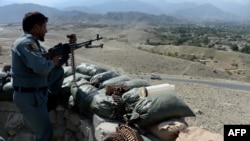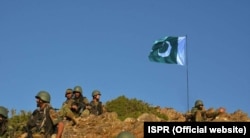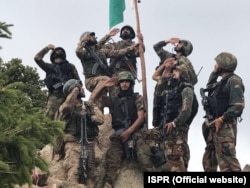Pakistan and Afghanistan continue to carry out operations targeting Islamic State militants along their shared border, but there are signs that the two countries are not communicating, making the effort less effective.
This week, Pakistan said that it just completed the first phase of its Khyber 4 operation against IS militants in the country's Khyber Agency.
"Terrorist hideouts were dismantled, and caches of IEDs [improvised explosive devices], arms and ammunition were seized," Pakistan Army's media wing (ISPR) said a statement.
But Afghan defense officials told VOA that Afghanistan and Pakistan had agreed that they would inform one another of planned operations against IS on both sides of the Durand Line, and that Pakistan did not do so with its recent operation against IS.
"Based on the agreement, both sides would exchange information based on which operation will be conducted under U.S. and China watch. Pakistan has not done so," Major General Daulat Waziri, spokesperson of the Afghan ministry of defense, told VOA.
Waziri added that Pakistan should target terror groups in the right locations.
"Pakistan Army should conduct operations in big cities and destroy them, as most of the centers for terrorist groups are located in big cities, not in the areas close to Durand Line," Waziri said. "Military operations need to be launched on both sides of the Durand Line. Everyone understands the terrorist sanctuaries are located in Pakistan."
Pakistan's military rejected Afghanistan's claims as "unwarranted."
"The information about Operation Khyber 4 has been shared [twice verbally and in written form] with Afghan forces as well as Resolute Support Mission," ISPR said in a statement issued last week.
Remote IS strongholds
Launched in July, Khyber 4 is part of the ongoing military operation Radd-ul-Fasaad, which is aimed at diminishing the Islamic State's threat in Pakistan and destroying the terror group's hideouts in the relatively isolated Rajgal valley in the tribal belt.
Rajgal valley of the Khyber Agency is situated in the semi-autonomous Federally Administered Tribal Area (FATA), sharing a border with Afghanistan's Nangarhar province, where IS offshoot Khorasan branch has made inroads in recent years.
Earlier this year, the U.S. military and the Afghan government promised to eliminate IS in Afghanistan by the end of 2017. Hundreds of IS fighters, including several senior commanders, have been killed in recent months.
In May, the terror group lost Sheikh Abdul Hasib, its leader in Afghanistan. Hasib was killed in a joint U.S. Afghan forces raid in eastern Nangarhar.
Pakistan has long denied the existence of IS in its territory, but analysts believe the recent operation aimed at cracking down on the terror group suggests Pakistan no longer denies its existence in the area.
"Pakistani government has until recently denied the presence of the Islamic State in Khyber Pakhtunkhwa," Khadim Hussain, a political analyst from Peshawar, told VOA. "Tehreek-i-Taliban Pakistan and several other banned terror outfits are able to work, recruit for the IS, and move freely on both sides of the border."
Hussain added that the long-running practice of both countries blaming the other for the militants "needs to be stopped. Pakistan and Afghanistan both are victims of terrorism and they'll have to join hands if they want to win this war."
In March, IS sympathizers distributed hundreds of pamphlets containing threats from IS in the semi-autonomous FATA, as well as some parts of northwestern Khyber Pakhtunkhwa province.







